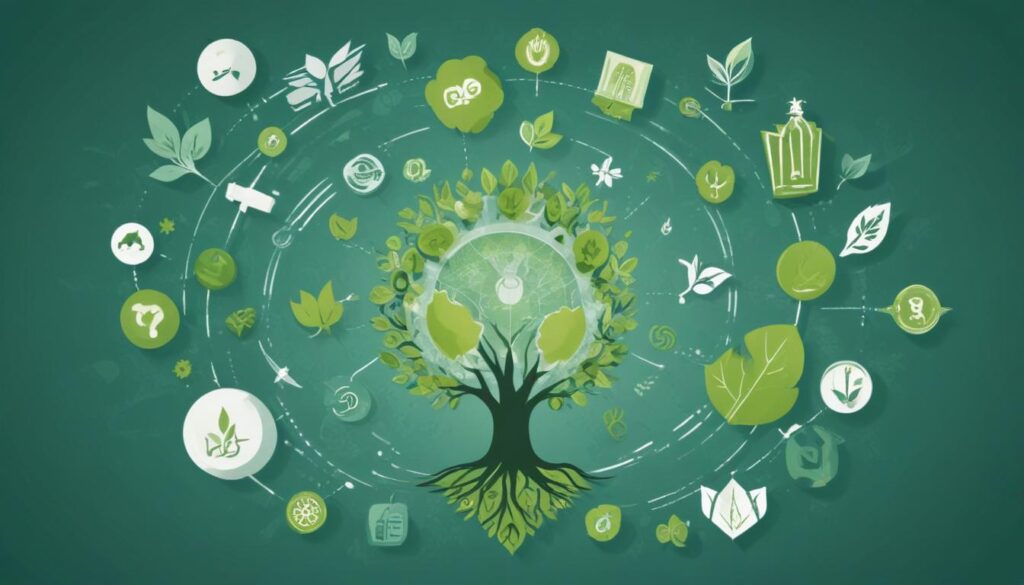Sustainable procurement focuses on sourcing goods and services that prioritize environmental, social, and economic impacts, ensuring that organizations engage in ethical sourcing and enhance transparency throughout their supply chains.
Sustainability is now a vital component for businesses, especially in light of recent discussions at the Sustainability LIVE Chicago event. How do these new directives affect our operations?
Introduction to Sustainability LIVE Chicago
The Sustainability LIVE Chicago event serves as a pivotal platform for professionals aiming to redefine their engagement with sustainability. This gathering showcases emerging trends and innovations reshaping industry practices. Participants gain insights from leaders in various sectors, emphasizing the crucial role of sustainable practices in achieving long-term business goals.
A key aspect addressed during the event is the importance of aligning sustainability goals with overall business strategies. Executive alignment plays a vital role in ensuring that sustainability initiatives are not only embraced but effectively implemented across all organizational levels. When leaders commit to sustainability, it sets a precedent and inspires staff at every level to adopt more eco-friendly practices.
Moreover, the event encourages collaboration between industries and stakeholders. By sharing best practices, attendees can learn from each other’s experiences, enhancing their capability to tackle common challenges. Engaging discussions highlight the necessity of adapting to changing regulations and consumer expectations, ensuring that organizations remain competitive.
Kathy Presto’s Role in Sustainability
Kathy Presto has positioned herself as a key figure in the sustainability dialogue, particularly at events like Sustainability LIVE Chicago. She emphasizes the need for actionable strategies that businesses can implement to enhance their sustainability efforts. Her insights often revolve around the integration of sustainable practices into core operational frameworks, driving both efficiency and responsibility.
By leveraging her extensive background in environmental policies, Kathy navigates complex regulatory landscapes to guide organizations. Her approach highlights the importance of cross-industry collaboration, encouraging companies to share best practices and innovations that can lead to measurable impacts.
Throughout her presentations, she underscores the significance of tracking progress and adjusting strategies in response to evolving sustainability challenges. This dynamic approach not only helps organizations meet compliance standards but also enhances their reputation in the marketplace. Kathy’s advocacy for continuous learning and adaptation is pivotal for any business aiming to thrive in a fast-changing environmental landscape.
Participants at the event frequently cite her discussions as not just informative but transformative, providing them with the tools needed to engage their teams effectively. Through her leadership, Kathy Presto inspires a collective movement towards a more sustainable future.
Importance of Executive Alignment
Executive alignment is crucial for successfully implementing sustainability initiatives within organizations. When top leaders commit to sustainability, it creates a clear direction and purpose throughout the company. This alignment fosters a culture where sustainability is prioritized and integrated into every business decision.
Moreover, executive alignment ensures that sustainability goals are aligned with business objectives. This synergy enables organizations to leverage their resources effectively, minimizing waste and maximizing impact. By embedding sustainability into the core strategy, companies can enhance their brand reputation and competitive advantage in the marketplace.
Communication plays a pivotal role in maintaining executive alignment. Regular updates and open dialogues between leadership and employees help in reinforcing commitment to sustainability goals. When executives actively engage and support sustainability initiatives, it instills confidence among employees, motivating them to contribute towards these objectives.
Furthermore, measuring progress is vital. Executives must establish clear metrics for sustainability performance, enabling them to assess the effectiveness of their strategies. This approach not only demonstrates accountability but also drives continuous improvement within the organization. In essence, executive alignment is the backbone of a successful sustainability journey, setting the tone for accountability and fostering a proactive approach to environmental responsibility.
Key Takeaways from the Women’s Procurement Panel
The Women’s Procurement Panel at Sustainability LIVE Chicago highlighted critical insights for advancing sustainability goals within organizations. One major takeaway was the significance of diversity in procurement, emphasizing that diverse teams bring unique perspectives that can enhance innovation and problem-solving.
Panelists discussed how organizations with diverse supplier bases are better positioned to meet customer demands and adapt to changing market conditions. They shared examples of successful partnerships that prioritize sustainability while supporting minority-owned businesses, showcasing the multifaceted benefits of inclusive procurement practices.
Another key point addressed was the role of integrating sustainability metrics into procurement strategies. The panelists advocated for establishing measurable sustainability goals that align with broader corporate objectives. This approach not only demonstrates accountability but also helps organizations track progress and refine strategies over time.
Furthermore, the women on the panel emphasized the importance of collaboration across different sectors. Building networks and sharing resources among organizations can amplify efforts toward sustainability. By working together, companies can drive substantial change in their supply chains and contribute to a more sustainable future. These discussions served as a catalyst for actionable strategies that organizations can adopt to enhance their procurement processes.
Impact of Legislation on Procurement
The impact of legislation on procurement practices is a critical topic in today’s business environment. Companies must navigate complex regulatory frameworks that can influence both sourcing strategies and supplier relationships. Recent laws focusing on sustainability and ethical sourcing are reshaping how organizations approach procurement.
For instance, regulations mandating the use of environmentally friendly materials have pushed businesses to reevaluate their supply chains. Companies are now increasingly required to document their sustainability practices and demonstrate compliance. This shift encourages innovation as organizations seek new solutions that meet legal standards while enhancing operational efficiency.
Moreover, procurement teams must stay informed about changing legislation. This awareness enables them to anticipate challenges and adapt their strategies accordingly. Collaborating with legal experts ensures that companies effectively manage risks associated with non-compliance.
Furthermore, legislation often promotes transparency in supply chains, pushing companies to engage with suppliers who adhere to ethical practices. This increasing transparency not only mitigates risks but also builds trust with consumers. Ultimately, understanding the regulatory landscape is vital for companies striving to maintain competitive advantages while fulfilling their legal obligations.
Sustainability Trends in Supply Chain
Sustainability trends in supply chain management are increasingly influencing how organizations operate. Companies are now prioritizing eco-friendly practices in their procurement processes, recognizing the importance of reducing their environmental footprint. This shift is not just beneficial for the planet; it also enhances brand reputation and customer loyalty.
One significant trend is the adoption of circular economy principles. Businesses are designing their supply chains to minimize waste and maximize resource efficiency. This approach involves rethinking product lifecycle, from sourcing raw materials to disposal, ensuring that materials are reused and recycled whenever possible.
Furthermore, technology plays a vital role in facilitating sustainability. Implementing advanced analytics and real-time tracking systems allows companies to monitor their supply chain’s environmental impact closely. Improved visibility can identify areas for improvement and streamline operations.
Collaboration is another emerging trend. Organizations are engaging with suppliers and partners to develop sustainable practices collectively. By forming alliances, businesses can share knowledge, resources, and strategies that promote sustainability throughout the supply chain.
Overall, embracing sustainability trends not only supports environmental goals but also drives innovation and operational efficiency, making companies more resilient and competitive in the marketplace.
Collaboration Opportunities for US Companies
Collaboration opportunities for US companies in sustainability initiatives have become increasingly vital as businesses face growing environmental challenges. By working together, organizations can leverage their resources and expertise to create more impactful solutions. This collaboration not only enhances sustainability efforts but also drives innovation across industries.
One key area for collaboration is in developing sustainable technologies. Companies can partner with tech firms to create eco-friendly products or improve existing processes, minimizing waste and reducing carbon footprints. These partnerships can lead to significant advancements in product efficiency and production methods.
Additionally, businesses can join forces in supply chain optimization. By sharing best practices and resources, companies can implement more sustainable procurement strategies. This collaborative approach can facilitate access to sustainable materials, reduce risks in sourcing, and foster better relationships with ethical suppliers.
Moreover, participating in industry coalitions or trade groups focused on sustainability allows companies to stay informed about the latest regulations and market trends. These networks offer platforms for sharing success stories, strategies, and resources that can help businesses navigate the complexities of sustainability.
Ultimately, fostering collaboration not only helps US companies address their sustainability goals but also positions them as leaders in the global shift toward environmental responsibility.
Diverse Perspectives on Sustainability
Diverse perspectives on sustainability play a crucial role in shaping effective strategies and practices. When individuals from different backgrounds come together, they bring unique insights that can drive innovation and enhance problem-solving. This diversity is essential for addressing the complex challenges associated with sustainability.
For example, perspectives from various industries can lead to groundbreaking approaches in sustainable practices. Companies in technology may focus on energy efficiency, while those in agriculture might prioritize soil health and biodiversity. By collaborating, these sectors can learn from each other and implement comprehensive solutions that benefit both the environment and the economy.
Furthermore, diverse perspectives extend beyond industry boundaries to include cultural and regional viewpoints. Understanding how sustainability issues affect communities differently allows organizations to tailor their strategies more effectively. For instance, urban areas may face challenges like pollution and waste management, while rural regions might focus on land use and resource conservation.
Additionally, engaging underrepresented voices, such as those from marginalized communities, strengthens sustainability efforts. These groups often bear the brunt of environmental degradation and can provide valuable insights into equitable practices that promote social justice alongside environmental protection.
Overall, integrating diverse perspectives not only enriches sustainability initiatives but also fosters a more inclusive approach to addressing global challenges.
Challenges Ahead for Businesses
Companies face numerous challenges ahead as they adapt to the evolving landscape of sustainability. One major challenge is compliance with an increasing number of regulations impacting environmental practices. Businesses must navigate the complexities of local, national, and international laws while ensuring their operations align with sustainability goals.
Additionally, securing sustainable resources has become critical. As demand for eco-friendly materials rises, businesses often struggle to find suppliers that meet sustainability criteria. This scarcity can lead to higher costs and limit options for companies aiming to improve their environmental impact.
Another significant hurdle is consumer expectations. Today’s consumers are more informed and demand transparency from brands regarding their sustainability efforts. Companies must invest in communication strategies that clearly convey their practices, failures, and successes in sustainability, which can be resource-intensive.
Moreover, the operationalization of sustainability goals often encounters internal resistance. Employees may be hesitant to change established practices, especially if they perceive these shifts as burdensome. Therefore, fostering a culture that emphasizes the importance of sustainability can be vital in overcoming this resistance.
In conclusion, while there are substantial challenges ahead for businesses seeking to enhance their sustainability efforts, these obstacles also present opportunities for innovation and growth as companies evolve to meet the demands of a changing world.
Future of Sustainable Procurement
The future of sustainable procurement is set to transform the way organizations manage their supply chains. As environmental concerns grow, companies increasingly recognize the importance of sourcing products and services that promote sustainability. This shift is driven by both regulatory pressures and consumer demand for responsible practices.
One crucial aspect of future sustainable procurement is the emphasis on ethical sourcing. Companies are expected to not only consider the cost and quality of materials but also their environmental and social impacts. This holistic approach encourages organizations to engage with suppliers who adhere to sustainable practices, fostering a more responsible supply chain.
Technology will also play a significant role in advancing sustainable procurement. The adoption of blockchain technology can enhance transparency, allowing companies to track the sustainability of their products from source to consumer. Additionally, AI-driven analytics will provide insights into supplier performance, making it easier for procurement teams to make informed decisions.
Moreover, collaboration among stakeholders will become essential. By forming partnerships with suppliers and industry peers, companies can share best practices and innovations that enhance sustainability efforts throughout the supply chain.
As these trends emerge, businesses that prioritize sustainable procurement will not only fulfill their corporate responsibility but also gain a competitive advantage in the marketplace.
In Summary: Embracing Sustainability in Procurement
As we look to the future, sustainable procurement is key for businesses seeking to thrive. Companies that embrace ethical sourcing, transparency, and collaboration will be better equipped to meet both consumer demand and regulatory requirements.
Utilizing technology, such as blockchain and AI, will enhance the ability to track sustainability efforts and improve overall supply chain efficiency. By prioritizing sustainability, businesses not only fulfill their responsibilities but also gain a competitive edge.
In essence, investing in sustainable practices today sets the groundwork for success in the future. As companies navigate these changes, they have the opportunity to lead in creating a more environmentally responsible marketplace.
Thus, the journey towards sustainable procurement is not just beneficial; it is essential for lasting growth and innovation.
Frequently Asked Questions
What is sustainable procurement?
Sustainable procurement is the process of sourcing goods and services in a way that considers environmental, social, and economic impacts. It involves choosing suppliers who prioritize sustainability.
How can technology enhance sustainable procurement?
Technology, such as blockchain and AI, can improve transparency and efficiency in the supply chain. It allows companies to track sustainability practices and make informed decisions.
Why is ethical sourcing important?
Ethical sourcing ensures that suppliers adhere to sustainable and socially responsible practices. It fosters trust and can enhance a company’s reputation among consumers.
What are the main challenges businesses face in sustainable procurement?
Businesses often face challenges such as compliance with regulations, securing sustainable resources, and meeting consumer expectations for transparency and ethical practices.
How can companies collaborate to improve sustainability?
Companies can collaborate by sharing best practices, forming partnerships with suppliers, and engaging in industry coalitions focused on sustainability initiatives.
What are the benefits of adopting sustainable procurement practices?
Adopting sustainable procurement practices can lead to cost savings, improved brand loyalty, enhanced supply chain efficiency, and a greater competitive advantage in the marketplace.


